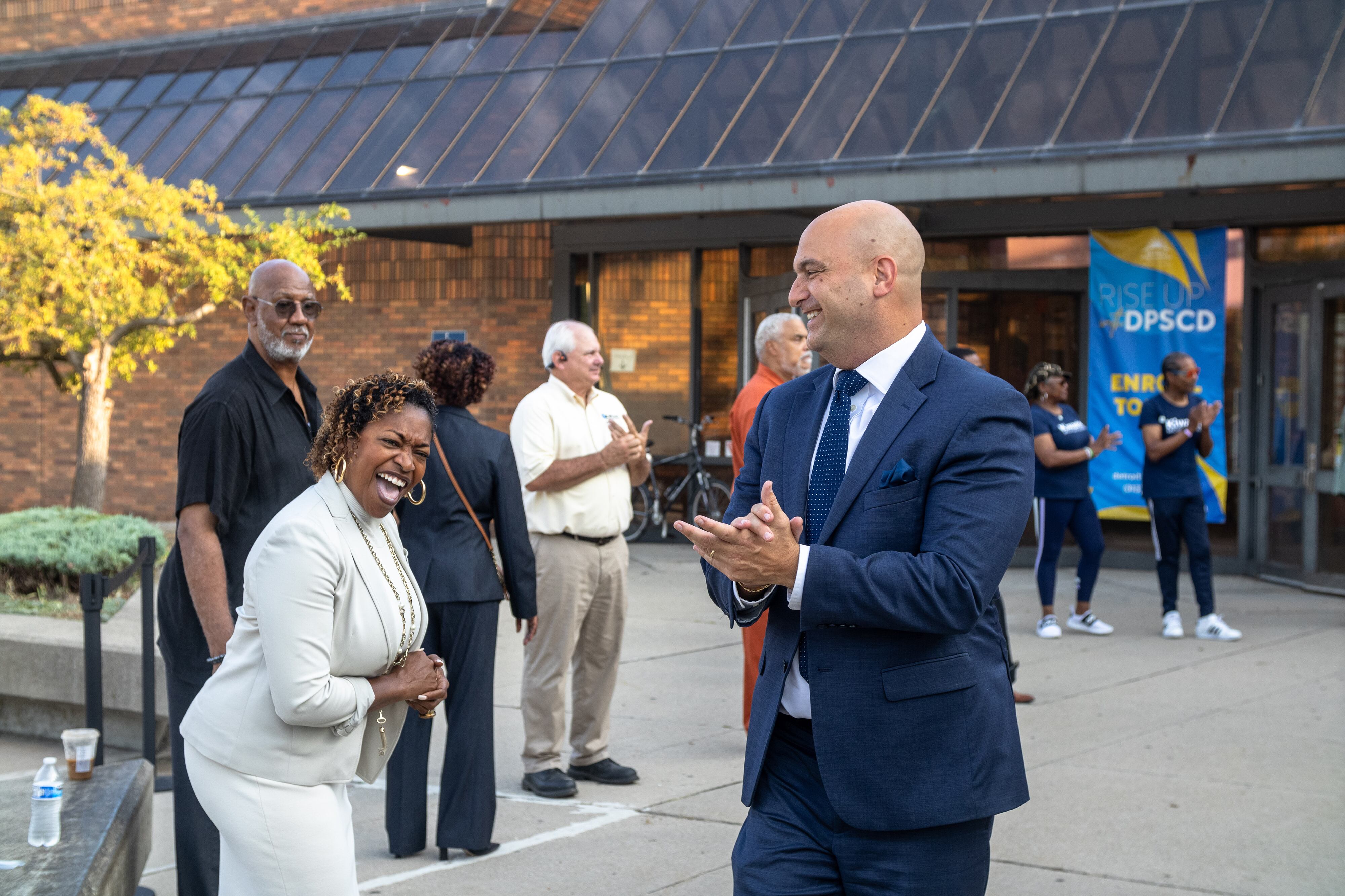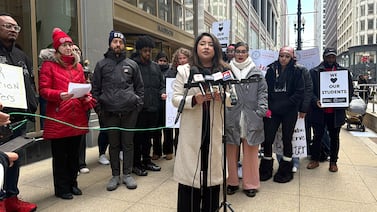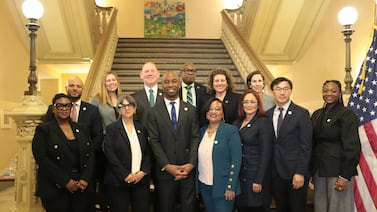Sign up for Chalkbeat Detroit’s free newsletter to keep up with the city’s public school system and Michigan education policy.
MACKINAC ISLAND – Beyond its struggles with chronic absenteeism and academics, another ongoing challenge for Detroit’s public school district is a “disruptive” proliferation of marijuana.
“It’s so accessible and prevalent now within the city and metro Detroit, it’s easy for everyday kids to come into contact with edibles,” Detroit Public Schools Community District Superintendent Nikolai Vitti told BridgeDetroit about an influx of dispensaries in recent years.
Vitti said the district has at least one incident a week when students between third and 12th grade are either experimenting with edibles or don’t know the products they are consuming are laced with marijuana.
“We haven’t lost any children, but it leads to vomiting, hallucinations, and kids being rushed to the hospital, which is traumatic and disruptive to the learning environment,” he said.
The Detroit public schools leader has been vocal about his concerns over the volume of marijuana businesses. In March, Detroit’s City Council approved an ordinance that bans advertisements for marijuana and nicotine vapes within 1,000 feet of schools, libraries, parks, recreation centers and other places likely to attract children. For its part, Vitti said the district is consistent with robocalls, letters, discussions with students and backpack checks – but a more aggressive campaign about the dangers of marijuana, responsible storage, and edibles are in order.
In the last five years, the state’s poison control center received about 1,500 reports of kids under 6 being exposed to or ingesting CBD, THC, or other cannabis products.
“We need ads, billboards, similar to what we saw in the ‘90s with cigarette campaigns. That worked. As long as we can educate our families and our children, we can curb it,” he said.
Vitti detailed the concerns during a wide-ranging interview with BridgeDetroit during the 2025 Mackinac Policy Conference and discussed building repairs, plans to phase out low-enrollment schools as well as absenteeism, his future goals, and the expectation of a bond to continue capital upgrades.
With less than two weeks left in the school year, Vitti said things are trending positively.
Graduation and literacy rates are improving, and a high school attendance incentive program has yielded some positive results, too. The program offered students $200 gift cards for perfect attendance over certain two-week periods this school year. The district, he said, saw a 2% increase in average daily attendance and an 8% drop in chronic absenteeism. The effort will continue next year and there’s potential to expand it to middle school students, he said.
During the 2023-24 school year, 66% of students in the district were chronically absent, which means they missed 10 or more days during the school year. Issues related to the city’s high rate of poverty have fueled the problem.
Vitti said the district has worked to attack concentrated poverty through health hubs, mental health support, and medical services, family resource centers that offer canned goods and other nonperishable items, eviction prevention services, and utility aid. It’s serving thousands of families, he said.
“Unfortunately, I don’t think it’s the district that should be doing that. But this is how we’re filling the gaps in a society that still hasn’t built out the right social networks to fill the gaps of poverty,” Vitti said during the Wednesday interview at the Grand Hotel.
The services, he said, are privately funded for the next two to three years and “it’s something we hope to sustain and scale as we go into the future.”
Vitti also reiterated the district’s use of $700 million in federal pandemic dollars toward building upgrades. Part of that is phasing out schools with low enrollments, he said.
Some schools are upwards of 80 years old and there aren’t residency rate increases. The district, he said, wants to put students in the best buildings possible, but DPSCD is avoiding random school closures, which wasn’t the case under emergency management.
“We were intentional with phase-outs,” he said. DPSCD’s facility master plan calls for phasing out low-enrollment schools over the next several years.
The end of this year won’t see those changes, but possibly next year to get ahead of potential federal cuts in Congress, Vitti said. “If we accelerate the closeout of about four to five schools, we might generate anywhere from $11 [million] to $19 million in general fund that we can use to possibly fill gaps that are created at the federal level that may not happen going into this school year, but the following school year.
“We’ve been phasing out those schools for the last three years, parents are well aware that this would come,” he said. “It was a way to not pull the rug out on those families.”
Other concerns looming for the district include the uncertainty surrounding Medicaid reimbursement, other federal programs that support educational services, and initiatives being floated that could impact the budget.
Vitti’s second contract renewal as superintendent is set to expire at the end of 2028.
He’s proud of the work he’s done in the past eight years for the district to be “now operating normally,” but said there’s much more to do.
DPSCD has seen some achievement gains, but overall proficiency on state exams remains low. Vitti said he has a “sense of pride” over the improvements, “but I’m not satisfied.”
“Our improvement in achievement is the highest it’s ever been as a district, but narrowing the gap between us and the state is what I want to continue to do,” he said. “We’ve seen anywhere from 3 to 5 percentage point improvements, which is a positive trajectory from even the state that’s been stagnant or declining. Obviously, we’re doing something better and differently, but it’s maturing systems, processes, and continuing to develop leaders.”
In the midst of a 2025 city election year, Vitti stressed he has no interest in the concept of an education commission in which he, school board members, and representatives from city government would discuss school-level issues.. It’s a concept that has been proposed in the past but been met with pushback.
“The people of Detroit elected a school board and that school board is elected and in power. It took a long time to get to this point and our track record of success is clear; whatever data point you want to look at, we’ve improved,” he said.
Vitti cited a reduction in teacher vacancies and a boost in teacher pay and retention. Detroit, he said, is now near the top in teacher retention in metro Detroit, and the DPSCD graduation rate is at 78%, only 4 percentage points away from the state average of 82%.
“The conversation (among mayoral candidates) should be less about ‘We should do something different from the governance point of view’ and think more about partnerships. How do we fill gaps that our families and our students experience through city partnerships,” he said.
“[Outgoing] Mayor [Mike] Duggan has done a great job of saying, ‘I’m gonna focus on the city, you focus on the school district. Let’s collaborate on things you can help me with and I can help you with,’” he said.
On Wednesday, Herb Strather, a real estate investor and chairperson of Strather Associates, said he is pitching plans to save two of the Detroit Renaissance Center towers pegged for demolition as part of billionaire Dan Gilbert’s redevelopment proposal.
Strather said he’s hoping to bring the idea to Duggan and General Motors Co. during the policy conference.
Strather said the Detroit Association of Realtors is seeking to purchase the towers from GM, and the concept calls for one to be used as a data storage facility. The other would be renovated into dormitories for 3,000 homeless students identified within DPSCD.
“It’s in our city’s interest to keep these buildings,” Strather said.
Vitti said the concept shows some promise, so long as someone else renovates the aging tower. Chronic absenteeism is directly connected to housing stability, but Vitti said DPSCD has enough on its plate with upgrading aging buildings.
“If the right people come to the table and the funding is there, there’s certainly an opportunity to create maybe a boarding school for boys or for girls or for families, just to continue to address the instability of housing,” Vitti said.
With the planned retirement of State Superintendent Michael Rice, Vitti also shared thoughts on what he’s seeking in Rice’s replacement: alignment and coherence.
Michigan students continue to struggle. The state’s fourth and eighth graders were behind peers nationwide in reading and about the same in math, according to 2024 data released earlier this year from the National Assessment of Educational Progress.
“Michigan continues to lag behind other states because we just don’t have coherency around what we should be doing in K-12,” he said. “Everyone agrees we need to do better. Most people agree on that, but we haven’t really seen alignment between whoever is in the governor’s seat, the legislature, and the Michigan Department of Education.
“As we look to the future – whether we are talking about a new state superintendent or a new governor – I think that’s going to be key if we’re going to improve systemically across the state.”
Vitti remains encouraged and motivated by Detroit and said he is not interested in the state-level post.
“But I’m certainly encouraging others to apply and talking to people on the side about who I think is the right person,” he said. “Ultimately, it should be someone who has a systemic view of what Michigan needs to improve systematically and has the track record of building those systems across the entire state, or at least a large district.”
As for his future with Detroit’s public schools, Vitti said academic and enrollment gains will be his focus throughout the remainder of his contract.
“Those are the couple things that I still want to accomplish,” he said. “Then hopefully, if I feel like it’s time and the board thinks it’s time to be part of a succession management process and we all agree on who the next superintendent is, I can help that person transition and the work can continue with continuity and not disruption.”
Christine Ferretti is the managing editor for BridgeDetroit. You can reach her at cferretti@bridgedetroit.com.
Malachi Barrett is a reporter for BridgeDetroit. You can reach him at mbarrett@bridgedetroit.com.






